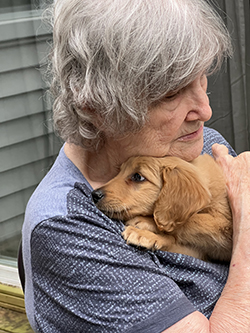We Got a Puppy - What Were We Thinking?!
Caring for a loved one with dementia is a lot of work. It takes a lot of time. Your day revolves around how they are doing, and who is going to help them. You can't just do your own thing. They are always a factor.
There is also an emotional toll, as they slip away and become less and less of the person you have always known and loved - that sense of loss if ever present.
For the love of Bailey
It was 9 months to the day that we lost our beloved black Lab mix, Bailey. We got her from a shelter in Buffalo 12 years ago. She was there for my dad when he lived with us. She delighted his dementia-affected mind. He loved watching her and laughed when her ever-wagging tail would smack his legs while he sat in his wheelchair.
Mom felt more comfortable being home alone, after dad passed, when Bailey was there to stay with her. They were buddies. Bailey was an excellent watch dog. She would bark to alert of any visitor, whether man or squirrel.
It took us a while to be ready for a dog back in our lives. There was a lot to consider. It was going to be a lot of work. Were we up to it? The rescue organizations asked a lot of questions and were very particular about us, too. They wanted to know how much the dog woulds be left alone.
Smitten with our new puppy
Since mom's Alzheimer's disease diagnoses and progression, we don't leave her alone for very long, just a few hours. If we were going to get a dog, this would be a good time since we are home most of the time now anyway. We also thought, maybe a dog will be good for us, to bring some joy back into our lives and be good for mom, too. We ended up getting a puppy. As if we didn't have enough work to do!
We are all smitten with Harper, our little Golden Retriever rescue pup, our mini muffin. We have learned a lot while trying to train Harper, this fuzzy little ball of fur. She has helped us care for my mom better.
Mom and Harper
Puppies need a lot of instruction, routine, patience and consistency. So does a person with dementia.
Harper can't communicate with us very well. She needs to be guided. She needs repetition. I need to get her on a schedule. All these have been true of my mom.
You need to give puppies good information, because they need to know what you want from them. They are eager to please, but they also do what they want to do unless you give them a better option. It is easy to get caught up in all the DON'Ts...
Don't bite me! Don't pee on the floor! Don't bark and whine! We need to give them positive options TO do, not just what we DON'T want them to do. Do pee outside! Do chew on this toy (instead of my ankles)!
I find I can be negative with my mom. Don't throw your toilet paper on the floor! Don't scrape your fork on your plate! Don't put your clothes on over your nightgown! Instead, I can say. Do put your toilet paper in the toilet. Good job! Let's cut your omelet with a knife, now you can eat it easier without scraping. Do take off your shirt. Yes. Now, let's put on your nightgown... Hands in your sleeves. Good job!
Positive praise is also good for puppies and moms.
What I'm learning
I have learned that I can't just throw a bunch of commands at my puppy. Say it once, and wait for her to respond. If I repeat it too often, it will lose its meaning. If she still doesn't get it, I can help her and repeat.

I find myself blurting a string of commands at my mom. It has got to be overwhelming. Mom has trouble with processes. She can only do one thing at a time. I need to slow down, be patient, and wait. Life is on her time now.
Applying lessons learned
Harper can't help her mistakes. She doesn't understand. She's just a puppy. I can see mom the same way. She can't help it. How can I hold anything against her either?
Even with all of the challenges, I am so happy that Harper has come into our lives. While mom continues her struggles, there will be a lot of 4-legged love to grow along the way.
How has a pet helped you and your family on this journey?
Join the conversation